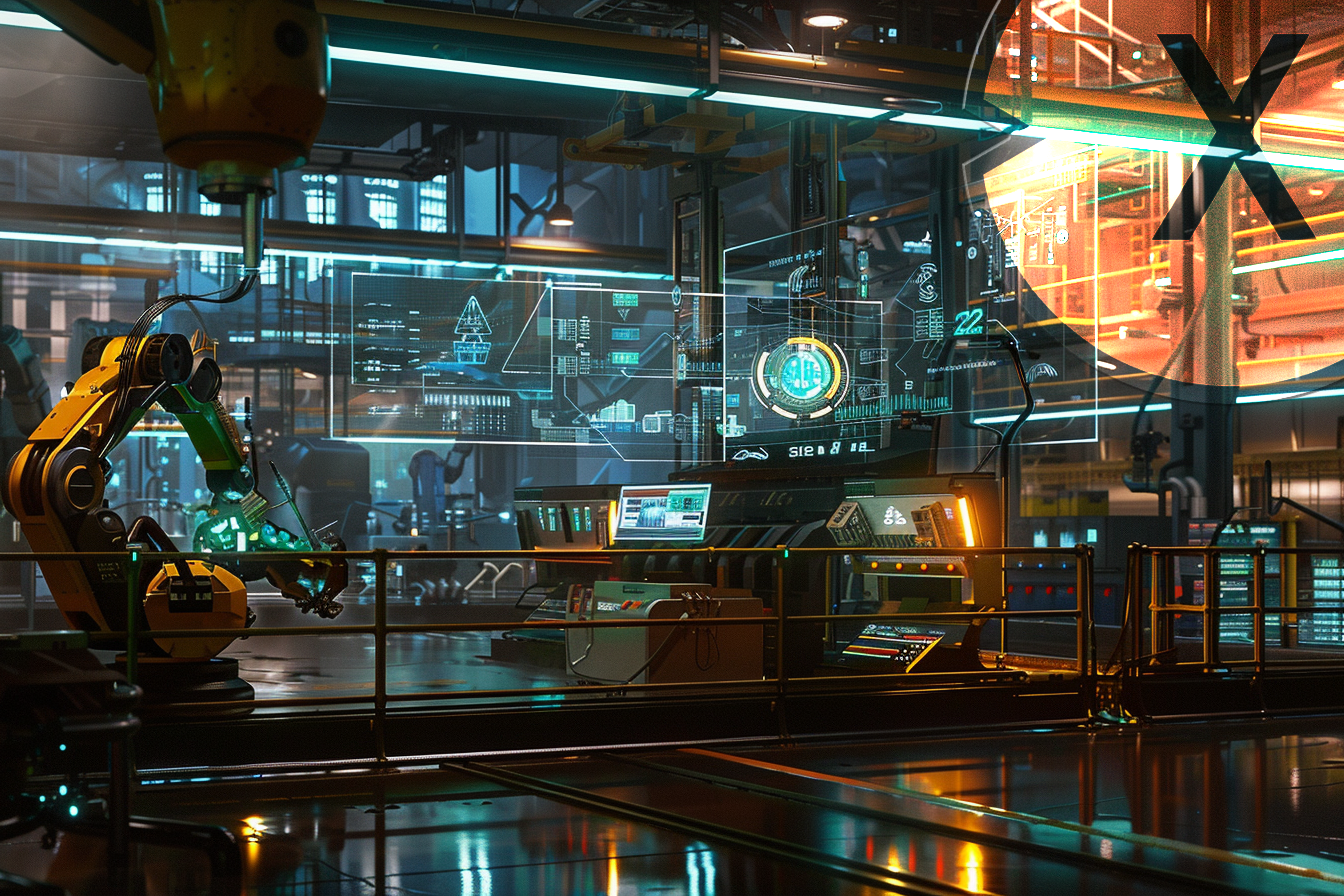The future of manufacturing in global SME mechanical engineering is digital, automated, sensor-controlled, networked, AI- and robot-supported
Published on: October 29, 2024 / Update from: October 29, 2024 - Author: Konrad Wolfenstein

The future of manufacturing in global SME mechanical engineering is digital, automated, sensor-controlled, networked, AI- and robot-supported - Image: Xpert.Digital
🤖 Automation and AI: The new standard for manufacturing
🌟 Innovative power and quality: SMEs’ path to top performance
The future of manufacturing in global SME mechanical engineering is increasingly digital, automated, networked and based on artificial intelligence (AI) and robotics. These developments not only open up new potential for small and medium-sized companies (SMEs) in the mechanical engineering industry, but also set new standards for efficiency, flexibility and quality in production. The use of cutting-edge technologies enables SMEs to compete in a global market characterized by growing competition, dynamic customer demands and rapid technological advances.
🔑 Digital transformation as the key to competitiveness
Digital transformation is essential in the modern manufacturing landscape. Companies that rely on digital tools and processes early on have a clear competitive advantage. At the center of this transformation is the concept of “Industry 4.0”, which promotes the integration of digital technologies into production processes. Smart machines and networked systems allow seamless communication and data transfer along the entire value chain. Sensors collect relevant production data in real time, which in turn is stored in cloud systems and analyzed by AI algorithms. This allows companies to create precise forecasts, identify potential bottlenecks and continuously optimize their production processes.
One advantage of digitalization is the possibility of simulating production processes and optimizing them before actual production. Virtual twins, i.e. digital representations of real production systems, enable risk-free planning and adjustment of production. SMEs can use this to reduce investment costs, avoid production downtimes and react quickly to market changes. In practice, this means that companies can respond to customer needs more flexibly and agilely and offer tailor-made solutions.
⚙️ Automation as a driver of efficiency
The automation of processes represents another central building block for the future of manufacturing in SME mechanical engineering. By using automated systems, routine tasks can be completed faster and more accurately. This not only increases productivity, but also reduces error rates and lowers production costs. For example, modern robots integrated into production lines take over monotonous or physically demanding tasks that were previously carried out by human workers.
Automated systems are also able to work around the clock, increasing production capacity and providing companies with greater flexibility. This flexibility can be crucial, especially in international competition, as companies can react more quickly to fluctuations in demand. By integrating intelligent robots into the manufacturing process, production not only becomes more efficient but also more scalable, making it easier to adapt to market fluctuations.
📡 Sensor-controlled systems for precise data analysis
Sensors are the heart of modern manufacturing systems and play a crucial role in process optimization. These systems continuously collect data on production parameters such as temperature, pressure, speed and quality and enable seamless monitoring of production processes. Combined with big data analytics and AI, companies can use this data to identify potential problems early and avoid failures.
The sensors make so-called “predictive maintenance” possible. This type of maintenance reduces unplanned downtime because machines are only serviced when it is actually necessary. A machine learning model based on historical data can identify patterns and provide indications when maintenance is imminent. This is particularly advantageous for SMEs, as unplanned downtimes can cause significant costs. Predictive maintenance optimizes maintenance cycles and helps reduce costs and increase machine life.
🌐 Networking as a basis for smart production processes
Networked production is the basis for modern manufacturing concepts. Machines, plants and systems are connected to each other through the “Internet of Things” (IoT) and communicate in real time. This communication enables seamless collaboration and ensures that each production step is optimally coordinated with the previous one. In this way, companies can improve their material flow, avoid bottlenecks and reduce production costs.
A fully networked production facility also makes it possible to react to global changes in the supply chain. Companies can track data about the origin and condition of raw materials and make real-time adjustments to address supply chain disruptions or raw material shortages. In this way, SMEs not only remain competitive, but can also respond more flexibly and proactively to external challenges.
🔍 Artificial intelligence as a decision-making aid
Artificial intelligence (AI) has the potential to revolutionize production processes in mechanical engineering. AI algorithms analyze large amounts of data collected by the connected systems and help companies make decisions. Based on the data, production plans can be created, production lines can be optimized and bottlenecks can be identified at an early stage. AI is also an important tool for quality control, as deviations or defects in products can be automatically detected and reported.
In addition to quality assurance, AI can also optimize personnel scheduling. By analyzing working times, production utilization and employee absences, human resources can be used efficiently. For SMEs, this means optimal utilization of employees and a reduction in personnel costs, which in turn increases competitiveness.
🤖 Robotics: A look into the future of production halls
Modern robot technology has ushered in a new era in industrial manufacturing. Today, robots are no longer only responsible for difficult or dangerous work, but are also increasingly taking on precise and demanding tasks that require the highest level of accuracy. The use of collaborative robots, so-called “cobots”, is particularly attractive for SMEs because they work side by side with people and can be easily integrated into existing processes.
These cobots can be used flexibly for various tasks and help increase productivity without the need for large investments in new systems. Especially in SMEs, which often have limited resources, the use of such robots offers a cost-effective way to raise production to a new level and at the same time improve working conditions for employees.
🌱 Challenge and opportunities of digital transformation for SMEs
Despite the numerous advantages, the digitalization of manufacturing also brings with it challenges. SMEs are often faced with the task of implementing new technologies without having the financial resources and technical know-how of large corporations. The step towards digitalization is often associated with high investment costs that do not pay off immediately. In addition, employees must be trained to deal with the new technologies, which requires additional effort and time.
Nevertheless, digital transformation also offers enormous opportunities for SMEs in mechanical engineering. By adapting to modern standards, they can significantly increase their competitiveness and open up new market segments. Especially in specialized niche markets where flexibility and innovation are required, SMEs have the opportunity to strengthen their position and stand out from the competition through tailor-made solutions.
🚀 The future of manufacturing in SME mechanical engineering
The technologies described will continue to gain in importance in the coming years and will have a lasting impact on the manufacturing landscape. SMEs that open up to digital change at an early stage will benefit from the advantages in the long term and strengthen their market position. The combination of digitalization, automation, AI and robotics enables these companies to establish innovative production models and meet the increasing demands of the global market.
The future of manufacturing in global SME mechanical engineering is exciting and promising. The use of modern technologies opens up a wide range of possibilities for increasing efficiency, reducing costs and ensuring quality. This development is an opportunity for companies that are ready to embrace new approaches and anchor digitalization as an integral part of their corporate strategy. Mechanical engineering will continue to be an important driver of innovation and growth in the future and give SMEs the opportunity to consolidate their role in the global economy.
📣 Similar topics
- 🤖 The future of manufacturing: AI and robotics in SME mechanical engineering
- 🔗 Networked systems: IoT as the basis of modern production
- 📊 Sensor-controlled processes: The path to precise data analysis
- 🌐 Mastering global challenges: Flexibility through digitalization
- 🚀 Industry 4.0: Opportunities for SMEs in international competition
- 🌱 Sustainability in manufacturing: increasing efficiency through automation
- ⚙️ Smart machines: drivers of digital transformation
- 🤝 Cobots in action: humans and robots hand in hand
- 📈 Competitive advantages through digital twins
- 💡 Artificial intelligence as the key to increasing efficiency
#️⃣ Hashtags: #Digitalization #IoT #Automation #ArtificialIntelligence #SMEInnovation
Our recommendation: 🌍 Limitless reach 🔗 Networked 🌐 Multilingual 💪 Strong sales: 💡 Authentic with strategy 🚀 Innovation meets 🧠 Intuition
At a time when a company's digital presence determines its success, the challenge is how to make this presence authentic, individual and far-reaching. Xpert.Digital offers an innovative solution that positions itself as an intersection between an industry hub, a blog and a brand ambassador. It combines the advantages of communication and sales channels in a single platform and enables publication in 18 different languages. The cooperation with partner portals and the possibility of publishing articles on Google News and a press distribution list with around 8,000 journalists and readers maximize the reach and visibility of the content. This represents an essential factor in external sales & marketing (SMarketing).
More about it here:
We are there for you - advice - planning - implementation - project management
☑️ SME support in strategy, consulting, planning and implementation
☑️ Creation or realignment of the digital strategy and digitalization
☑️ Expansion and optimization of international sales processes
☑️ Global & Digital B2B trading platforms
☑️ Pioneer Business Development
I would be happy to serve as your personal advisor.
You can contact me by filling out the contact form below or simply call me on +49 89 89 674 804 (Munich) .
I'm looking forward to our joint project.
Xpert.Digital - Konrad Wolfenstein
Xpert.Digital is a hub for industry with a focus on digitalization, mechanical engineering, logistics/intralogistics and photovoltaics.
With our 360° business development solution, we support well-known companies from new business to after sales.
Market intelligence, smarketing, marketing automation, content development, PR, mail campaigns, personalized social media and lead nurturing are part of our digital tools.
You can find out more at: www.xpert.digital - www.xpert.solar - www.xpert.plus
















